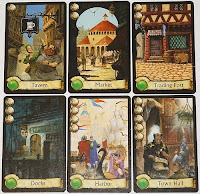
Many years ago I discovered modern European games and went out to buy a few. Most lay unplayed on the shelf as my Texas friends preferred to hike, swim, relax in the sun, or sip margaritas in the warm evening's air. The brisk Boston weather is better suited for indoor activities and recently I unpacked Citadels to give it a spin. After several rounds of gaming I can see why this is such a popular and well reviewed game.
In a game of Citadels the players compete to see who can build up a city area fastest and best. In a given turn a player will have a hand of cards, each depicting a building or city area- "Tavern" for example, or "Palace." During a turn you may choose to get more cards for your hand or get some gold coins. You can then spend gold to build your tavern, palace or what have you. When a player builds something they put their card in front of them and return the cost in gold coins back to the bank. Finally the turn moves to the next player.
 Building things has some simple dynamics. Larger building and sites cost more gold, so a tavern is cheaper to build than a palace. Players may have to wait to collect enough gold to build what they want and they may have to choose to collect more cards if the ones in their hand are unsuitable for some reason. Victory is simple as well, the first person to build eight things ends the game- the remaining players finish the round and then everyone totals up the cost in gold of all their buildings. The person with the most expensive array of buildings is the winner. There are a few details to scoring but as you can see this is a very simple game.
Building things has some simple dynamics. Larger building and sites cost more gold, so a tavern is cheaper to build than a palace. Players may have to wait to collect enough gold to build what they want and they may have to choose to collect more cards if the ones in their hand are unsuitable for some reason. Victory is simple as well, the first person to build eight things ends the game- the remaining players finish the round and then everyone totals up the cost in gold of all their buildings. The person with the most expensive array of buildings is the winner. There are a few details to scoring but as you can see this is a very simple game.Citadels becomes a brilliant and satisfying game through a simple mechanic. In each turn a player chooses a "character" to be.
 Examples include "thief," "king," or "bishop." Each character comes with certain special abilities. For example, the thief gets to steal gold from another character. The bishop gets extra gold for each religiously themed building they own. Imagine that you've built a temple and a monastery and that this turn you really need gold in order to build some extra fabulous site. You might try and be the bishop. You collect extra gold and can build your palace. But next turn you could choose a different character in order to accomplish a different goal.
Examples include "thief," "king," or "bishop." Each character comes with certain special abilities. For example, the thief gets to steal gold from another character. The bishop gets extra gold for each religiously themed building they own. Imagine that you've built a temple and a monastery and that this turn you really need gold in order to build some extra fabulous site. You might try and be the bishop. You collect extra gold and can build your palace. But next turn you could choose a different character in order to accomplish a different goal.In our trial game the players found that jockeying for the choice characters was a lot of fun. Some characters can allow you to steal or interfere with other players and so in addition to giving gold and perks your choice could decide who has their building demolished or who gains or loses cards. The rules managed who can pick a character first and ensured that we all had our moments to get the special abilities we needed. The strategy of picking the right character at the right time adds huge depth to this simple game.
Citadels had a few more strengths. One is that it works well with a big group. we played with seven. Further, it's a quick moving game and you could probably finish in thirty to forty five minutes. The game is also quite inexpensive compared to some eurogames that retail for fifty or more dollars. Finally, the game is quick enough that you rarely get a staggering victory or humiliating loss, a nice touch if playing with people who hate to lose.
I would recommend Citadels to anyone looking for a simple and quick group game with the possibility of deep strategy. Children ages ten and up could probably play well and teens will grasp the deeper nuances after a few rounds.
Pros: simple, deep strategic potential, fast play
Cons: may be of little interest if the theme of building cities is uninteresting
Beyond the Basics: Insane potential for strategy and improvement, several expansions




No comments:
Post a Comment